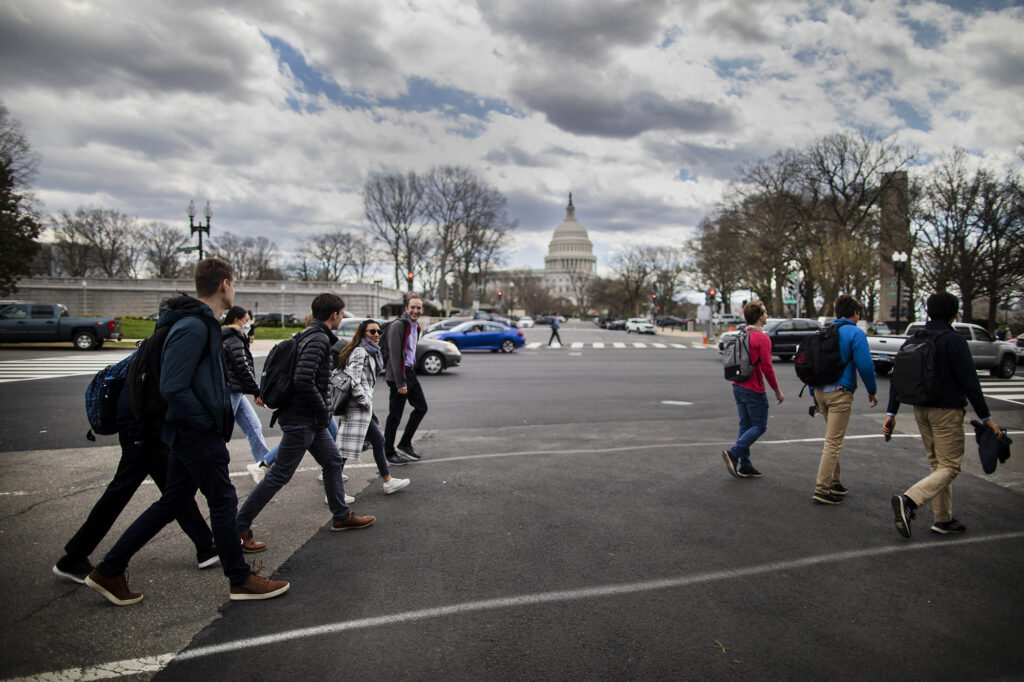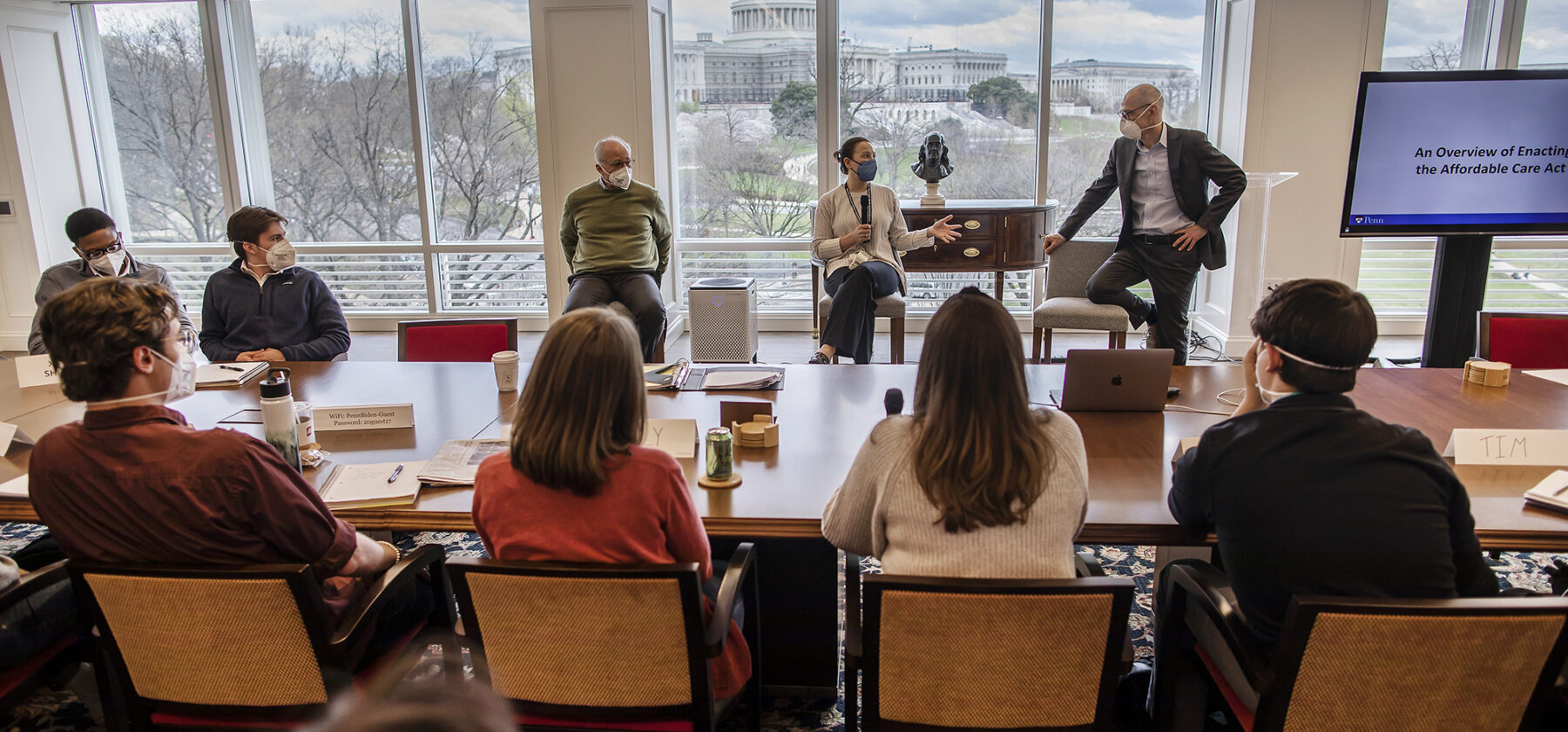Learning the inner workings of Washington, D.C., typically comes after a long career inside the Beltway, from how politicians manage to reach across the aisle and make successful policy decisions to understanding the role of think tanks and media.
But thanks to funding from the Stavros Niarchos Foundation (SNF) Paideia Program, a few dozen students at Penn and George Mason University had that experience condensed into a single spring course—How Washington Really Works. The innovative class, co-taught by Penn Vice Provost for Global Initiatives Ezekiel Emanuel and Pulitzer Prize-winning former Washington Post columnist Steven Pearlstein, brought the students from Penn and George Mason every Friday to the Penn Biden Center at the base of Capitol Hill in Washington.
In a conference room with a full wall of floor-to-ceiling windows facing the U.S. Capitol building, the class looked at eight case studies to explore post-World War II policy debates, political dealing, institutional dynamics, and the personalities, motivations, and ambitions of the people involved in enacting legislation and operating the federal government.
The course demonstrates that dialogue across difference is a crucial component of the policymaking process.
~Leah Anderson, executive director of the SNF Paideia Program
Every class involved high-profile Washington insiders as guests who could speak to their areas of expertise.
“They’ve had an opportunity to hear from people at the highest level of government: a former chief of staff, a former majority leader in Congress, a national security adviser to a president, the head of the New York Times Washington bureau,” Emanuel says. “Tom Donilon was advising Obama on whether to send Navy Seals in to kill Osama bin Laden and how to weigh that choice. Hearing from someone like that doesn’t happen every day for Penn students, or for any student anywhere. Having these speakers week after week is a pretty amazing, insightful experience.”
Case studies included topics like John Kennedy and the Cuban Missile Crisis, featuring Donilon as the day’s speaker; Bill Clinton’s Welfare Reform efforts, with Tom Daschle, former Senate Democratic/Majority Leader, as guest speaker; and George W. Bush, Barack Obama, and the 2009 Auto Bailout, featuring speaker Tim Geithner, former Secretary of the Treasury.
A good fit with SNF Paideia’s mission
Emanuel and Pearlstein, now Robinson Professor of Public Affairs at George Mason, connected about 12 years ago, when Pearlstein was covering the passage of the Affordable Care Act for the Washington Post, and Emanuel was helping Obama craft the law in his role as health policy advisor. They developed a friendship over the years, and when Pearlstein transitioned into a new role as college professor, they started to talk about possible classes looking at the ways of Washington, Emanuel says.
“Both of us were lamenting how little students understood what really drives things in Washington and how the political workings of Washington have changed. So, we hatched a plan to get students to think about civic life in different ways, to read newspaper articles about bills and hearings in a different way, to help them understand what’s going on today in government and how to get things done,” Emanuel says. This spring was the inaugural launch of the How Washington Really Works course.
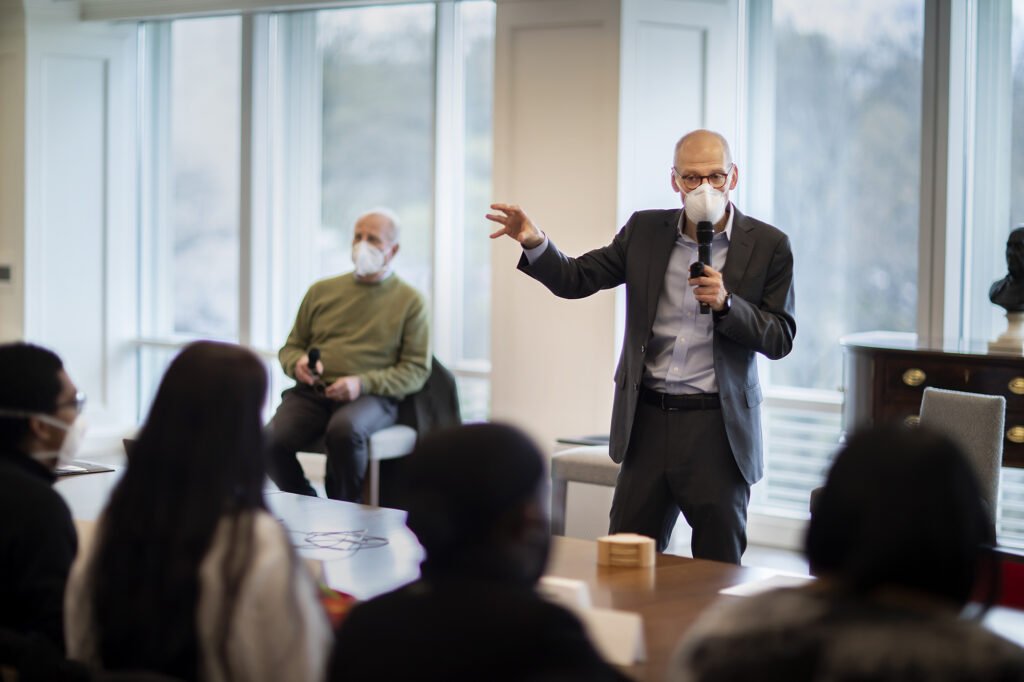
Emanuel and Pearlstein alternated weeks of teaching, with the first third of the 3 1/2 hour-long class a lecture followed by lunch, and then an hour devoted to the guest speaker, with the final hour a class discussion of the case study. On the day they discussed the Affordable Care Act (ACA), after Emanuel shared his firsthand knowledge, guest speaker Liz Fowler gave her insider view on helping write the ACA and her efforts to achieve bipartisanship. At the time, Fowler was chief health counsel to former Senate Finance Committee Chairman Max Baucus, the Democrat from Montana who played an influential role in the debate on health care reform. Today, she works for the agency overseeing Medicare.
In the final weeks of the course, students worked in groups of politically like-minded colleagues to come up with comprehensive, realistic policy proposals to either regulate big tech, reduce poverty, or secure the promise of racial justice.
The class is a SNF Paideia-designated course at Penn, which are classes that aim to examine the theory and practice of dialogue across differences.
The course demonstrates that dialogue across difference is a crucial component of the policymaking process. Students interact directly with a variety of guest speakers with whom they may disagree,” says Leah Anderson, executive director of the SNF Paideia program. “In addition, Penn and George Mason students learn from each other as they exchange views on real world issues. The professors highlight changes in cross-party collaboration in policymaking over time and themselves model robust dialogue as they teach from their distinct professional and political perspectives.”
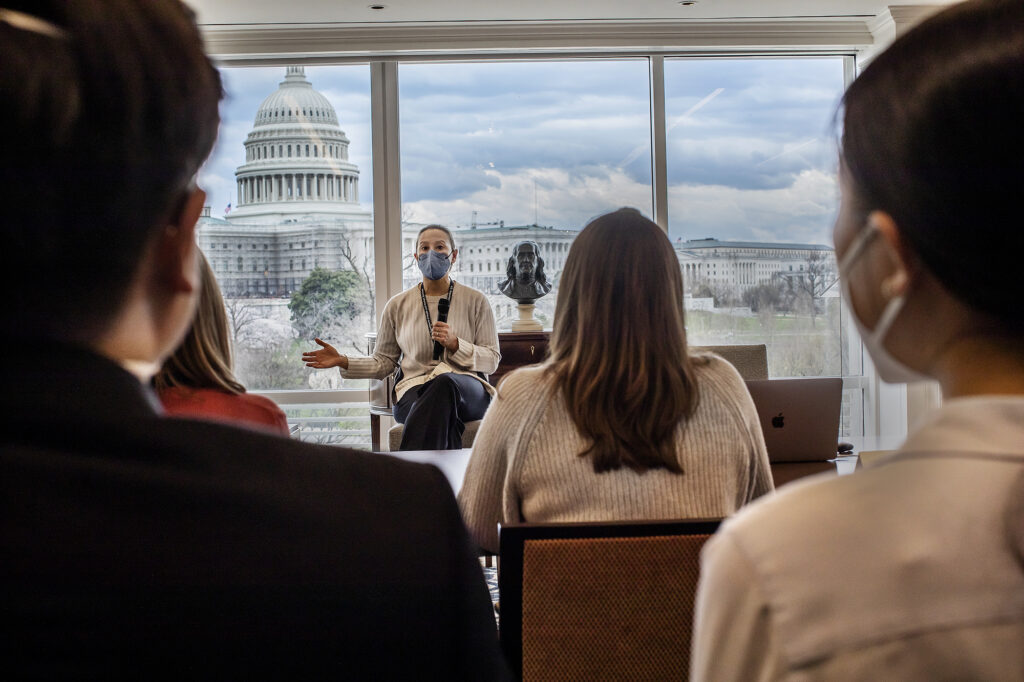
This course is a particularly good fit with SNF Paideia’s mission, Emanuel says, since one goal is to get students excited about public service and getting involved in the political process, both on the left and the right.
“We have students across the political spectrum, and it’s interesting to have that diversity in the classroom and that range of perspectives for a course focused on politics,” he says.
Pearlstein says the class differs from a standard political science course in that it treats politics and governing more as an art—or at least a craft—than a science.
“What I hope we can do in this course is cure students of the deep cynicism, and a lot of their ideologically driven assumptions, that they bring to political and policy issues,” Pearlstein says. “They should come away with a lot more nuanced and sophisticated view of why politicians and institutions behave the way they do, why things happen and why they don’t.”
The student perspective
Sam Brause, a senior computer science major from Larchmont, New York, says he took the class because it was his final semester at Penn, and he wanted to take something totally different from his computer science courses.
“I love being able to take courses in a variety of fields to see how I can use computer science to improve these industries or use my skills to help improve the world in different ways,” he says.
The wide range of speakers was one of Brause’s favorite parts of the class.
“It’s a great way to learn from the source about how politics really works, how the different parts interact, what real problems still exist, and how we can most effectively solve these problems,” he says.
In one sense, everyone in America is involved in deciding what happens in Washington, whether it’s through voting or volunteering for a candidate.
~Liam Alexander, a senior studying philosophy, politics, and economics
Brause says taking classes with George Mason students offered a valuable perspective and he appreciated the rapport the professors had with each other. And taking the class in Washington itself was particularly beneficial, Brause says.
“It has been amazing to see how senators and congressmen and lobbyists and all these parties interact at a geographical level, to see how the chess pieces move so that people can make deals that best suit their political interests,” he says.
Molly Reed, a senior at George Mason majoring in political science, says collaborating with Penn students has been the highlight of the class.
“Also, getting the chance to learn from two renowned experts in the heart of D.C. was not something I wanted to pass up,” she says.
Being so close to the Capitol building was awe-inspiring, Reed says.
“Most of us have dreamed of working in politics for years, you can imagine how inspiring it is to be learning at the foot of where our nations’ decisions are being made,” she says. “It so happened that the day we were discussing Clarence Thomas’ Supreme Court nomination was the day Justice Ketanji Brown Jackson was nominated. Watching history happen across the street from our class is a memory none of us will forget.”
Liam Alexander, a Penn senior studying philosophy, politics, and economics from Matthews, North Carolina, said he appreciates how the class gives a true-to-life feel for how policymaking really happens.
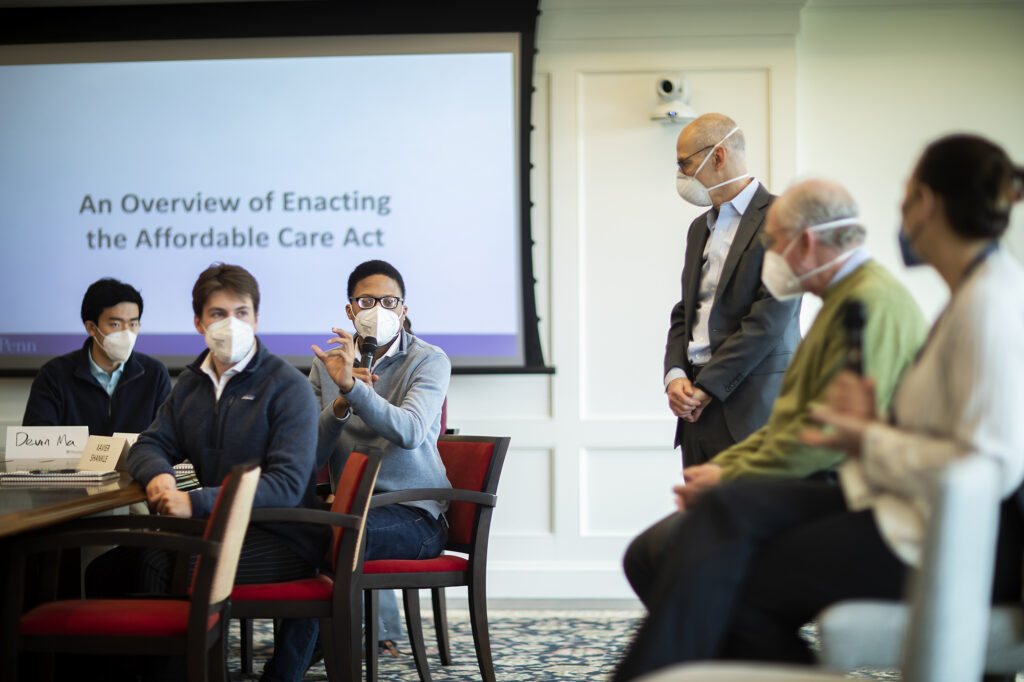
Having the class take place in Washington was beneficial because it gave them access to high profile guest speakers who could pop by on their lunch hour, which would be more difficult had the class taken place on Penn’s campus. An unexpected bonus was the Amtrak trip every Friday, where Alexander discovered he could really focus and study for other classes on the train ride.
“There are cool moments in class where you’re looking at the Capitol building through the window and just feel a sense of being there and seeing the actual place where a lot of the things we’re talking about were happening,” he says.
George Mason student Pearl Matibe, a government and international politics major from Washington, D.C., says she took the class hoping to get a sense of the cultural, political, and economic dimensions that shape what happens on Capitol Hill. The class didn’t disappoint, she says, from the guest speakers, to having a professor from another university to the location itself.
While a university campus lecture hall has a similar look and feel in many cities across America, there is no other place on earth where the Capitol building—a distinct symbol to the world—is within view throughout class,” she says. “You can pick any class seat, and you have a panoramic view of the Capitol, and from the rooftop, Capitol Hill.”
Alexander’s main takeaways are how ideas can circulate in Washington, and even if they don’t seem politically feasible at a certain time, that doesn’t mean they can’t be realized at a point in the future. He also has been struck by how much Washington runs on personal relationships and trust.
The class is valuable, even if students aren’t planning to go into politics, he says.
“The decisions being made in Washington are going to affect everyone in important ways. In one sense, everyone in America is involved in deciding what happens in Washington, whether it’s through voting or volunteering for a candidate,” he says. “Having an understanding of how to read the news and know what’s going on there, how policy change does actually happen and understanding the types of people who you would want to be in Washington is very useful knowledge.”
